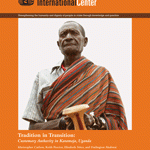Customary authority in the Karamoja region of Uganda has undergone profound shifts in parallel to the changing livelihoods and security conditions in the region over the past several decades. This study, funded by Irish Aid Kampala, examines the evolution of customary authority among four population groups: the Jie, Dodoth, Matheniko, and Tepeth. Overall, the study finds that customary mechanisms have been slow to adapt to the changes in the region and have seen decreased influence over the day-to-day legal, economic, diplomatic and ritual affairs of local communities. Interrelated factors contributing to this decrease in influence include the loss of livestock in the region and the shift away from pastoral livelihoods; modern influences of education, migration and commoditization; the delay in succession of authority from one generation-set to the next; the rise in criminal behavior by young men; the erosion of external peacemaking by male elders; and the expanded reach of state institutions of governance.
Customary authority mechanisms do, however, continue to play an important role in the region and are often the preferred avenues for redress for specific complaints and violations. In particular, customary systems are seen as more transparent and more appropriate in their focus on compensation and the reconciliation of communal relations when compared to the official state law and order systems. This study examines the perceptions of male elders, male youth and women regarding the status of customary institutions within their community. The study also investigates the interaction between official and customary systems and offers recommendations for national and international actors working in the Karamoja region.
Click here to read the summary of this report.







